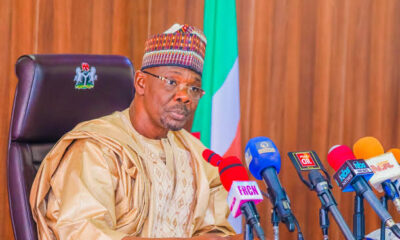Headline
Gov Sule charges real sector conference to proffer practical solutions to economy

Gov. Abdullahi Sule of Nasarawa State has charged participants at the Nasarawa State University Keffi (NSUK) 1st International Real Sector Conference to proffer practical solutions to rejuvenate the economy.
He gave the charge on the first day of the two days conference on real sector productivity held at the University in Keffi Local Government Area of the state.
The theme of the conference is “Rejuvenating the sector productivity in Nigeria”.
Sule challenged participants to get real and proffer workable and practical solutions that would rejuvenate the real sector in Nigeria for optimal productivity which in turn would impact on the economy of the country positively.
“The question we should be asking ourselves here is that why are we not getting it right in the real sector in Nigeria?
“So let us proffer practical solutions so that we don’t just end up having an event and having all the communique and all that and then they end up in our offices. Let us ask ourselves what is that is possible and how do we contribute,” he said.
He said their recommendations should also be useful in shaping a better future for the real sector in Nigeria so that future Nigerians could build on that.
“So we must sit down and deliberate on what exactly is our problems in this sector. Are we ready to make sacrifices? And we must make sacrifices because that is the only way we can move forward.
“I want to assure you that in Nigeria we can change the narratives but it will take all of you here to convince the rest,” he said.
Prof. Suleiman Bala-Mohammed, Vice Chancellor, NSUK, commended the university’s Department of Business Administration for organizing the conference and urged the department to sustain it as it would be a platform for cross fertilisation of ideas and wider conversations on local and international issues.
He also urged participants to brainstorm and come up with policy recommendations on how to rejuvenate the real sector in Nigeria.
Mr John Mamman, Nasarawa State Commissioner for Education, however, told NAN that he expected the outcome of the conference would change the narratives because the real sector, according to him, is the driver of the economy.
“The manufacturing, construction, engineering and others are the real movers of the economy. Once we get it right from the drivers of the economy, other sectors will also be impacted positively,” he said.
Headline
Fagbemi warns against obstructing EFCC from performing its lawful duty

The Minister of Justice, Lateef Fagbemi, SAN has warned against obstructing the Economic and Financial Crimes Commission (EFCC) from carrying out its lawful duty .
Fagbemi’s warning is contained in a statement in Abuja.
“This is a matter of very grave concern, it is now beyond doubt that the EFCC is given power by the law to invite any person of interest to interact with them in the course of their investigations into any matter, regardless of status.
“Therefore, the least that we can all do when invited, is not to put any obstruction in the way of EFCC, but to honourably answer their invitation.
“A situation where public officials who are themselves subject of protection by law enforcement agents will set up a stratagem of obstruction to the civil and commendable efforts of the EFCC to perform its duty is to say the least, insufferably disquieting’’.
He added that running away from the law will not resolve issues at stake but only exacerbate them.
“Nigeria has a vibrant judicial system that is capable of protecting everyone who follows the rule of law in seeking protection.
“I therefore encourage anyone who has been invited by the EFCC or any other agency to immediately toe the path of decency and civility by honouring such invitation instead of embarking on a temporising self-help and escapism.
“This can only put our country in bad light before the rest of the world’’.
He said institutions of state should be allowed to function effectively and efficiently.
“I stand for the rule of law and will promptly call EFCC, and indeed any other agency to order when there is an indication of any transgressions of the fundamental rights of any Nigerian by any of the agencies’’.
NAN reports that the EFCC had on Wednesday warned members of the public that it was a criminal offence to obstruct officers of the Commission from carrying out their lawful duties.
Section 38(2)(a(b) of the EFCC Establishment Act makes it an offence to prevent officers of the Commission from carrying out their lawful duties. Culprits risk a jail term of not less than five years.
The warning , the EFCC said, became necessary against the background of the increasing tendency by persons and groups under investigation by the Commission to take the laws into their hands by recruiting thugs to obstruct lawful operations of the EFCC.
On several occasions, the anti graft agency said, operatives of the Commission have had to exercise utmost restraint in the face of such provocation to avoid a breakdown of law and order.
Headline
Unknown Gunmen Abduct Channelstv Reporter In Port-harcourt

Some unknown gunmen have kidnapped Joshua Rogers, the ChannelsTV reporter in Port-Harcourt, the Rivers State capital.
Politics Nigeria learnt that Rogers was picked up close to his residence at Rumuosi in Port Harcourt and to an unknown destination by the gunmen around 9pm on Thursday, April 11.
The reporter was driving his official ChannelsTV branded car when the hoodlums accosted, pointed a gun at him and took him away in the same vehicle.
Rogers was said to be returning from his official assignment in Government House after a trip to Andoni for a government event when the incident happened.
Already, the gunmen were said to have contacted his wife and demanded a N30million ransom for bis release.
His cameraman confirmed the incident and appealed to his abductors to set him free unconditionally.














